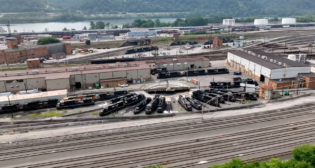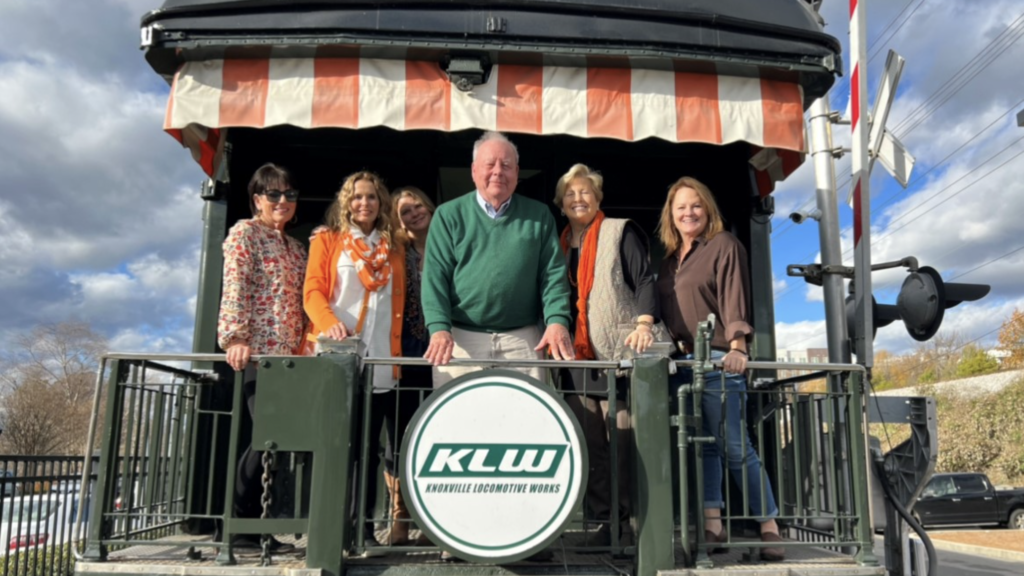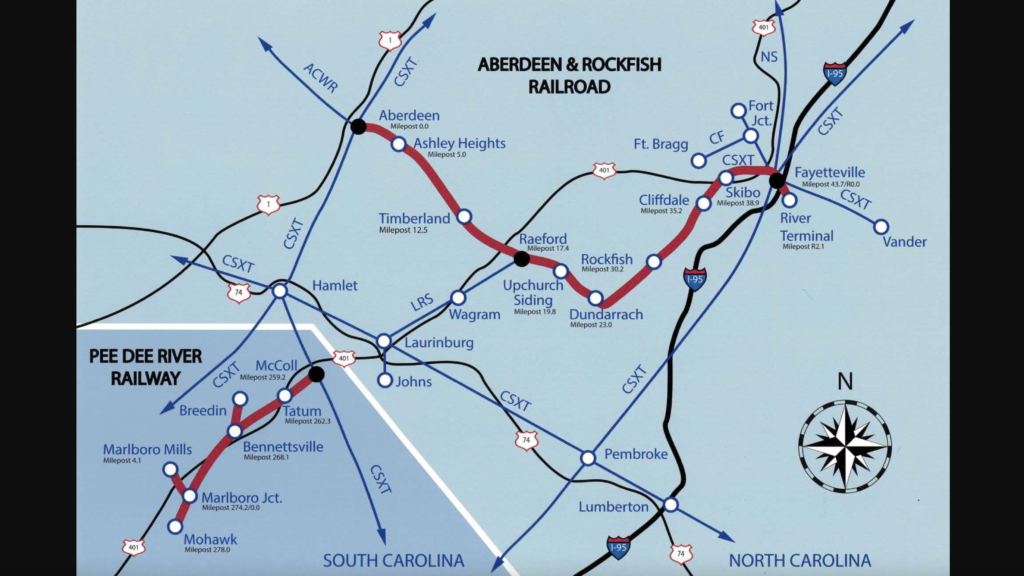
ASLRRA Names Short Line Hall of Famers for 2023
Written by Marybeth Luczak, Executive Editor
Pictured (left to right): Pete Claussen, Bruce M. Flohr, Ed Lewis and Richard Robey are ASLRRA’s 2023 Short Line Railroad Hall of Fame inductees.
The American Short Line and Regional Railroad Association (ASLRRA) has announced that Herman Peter (“Pete”) Claussen II, Bruce M. Flohr, Edward (“Ed”) Lewis, and Richard Robey have been selected to join the Short Line Railroad Hall of Fame. They will be inducted on April 3 at the association’s annual conference and exhibition. Lewis, who passed away in 2015, will be honored posthumously.
The Short Line Hall of Fame recognizes “short line railroad visionaries who through their dedication, commitment, and achievement best exemplify the qualities of innovation, entrepreneurialism, perseverance, and service that have advanced the short line railroad industry,” ASLRRA reported March 7.
“Our industry stands on the shoulders of individuals who took great risks and tackled great obstacles with grit and determination,” ASLRRA President Chuck Baker said. “These individuals have each added their own chapter to the all-American short line railroading story. We are grateful for the leadership of those that have come before us, and inspired by their achievements.” This third cohort of Hall of Fame inductees, he added, “each took small companies that they started or joined early and brought them to the pinnacle of industry leadership, providing a playbook for many other short liners to emulate.”

Pete Claussen learned to love railroads thanks to his German grandfather, who couldn’t speak English but who connected with his young grandson by taking him to a park near their New Jersey home to watch for trains that passed on adjacent tracks, according to ASLRRA. “His first career as a lawyer laid the groundwork for a successful career in railroading,” the association said. “His experiences at the Tennessee Valley Authority and the Knoxville International Energy Expo, which organized the 1982 World’s Fair, provided connections leading to a role as President of the South Central Tennessee Railway, in 1983.” Following the passage of the Staggers Rail Act in 1980, Claussen founded Gulf & Ohio Railways Inc. (G&O), and on Dec. 31, 1985, Claussen’s first railroad, one of more than 18 that he would purchase, the Mississippi Delta, ran its first train. Today, G&O, of which Claussen is Chair, operates four short lines in Tennessee, South Carolina and North Carolina, and a tourist train in Tennessee. The company also owns Knoxville Locomotive Works.
“Over the years, Claussen’s passion for trains has converged with his interest in studying history and preserving historical artifacts,” ASLRRA reported. “From finding and restoring locomotives, to being active in preservation of culture, animal habitats and parkland, Claussen has preserved history for the next generations.” Visitors to Washington, D.C., can visit the Linda and Pete Claussen Hall of Democracy in the National Museum of American History, or the National Museum of African American History and Culture where they will see another of Claussen’s contributions: a Jim Crow-era segregated railroad car that serves as one of the featured items in the museum’s Defending Freedom, Defining Freedom exhibition. He has been Chair of ASLRRA’s Legislative Policy Committee and served on the association’s Board and Executive Committee. (Claussen in 2021 was selected for Honorable Mention by Railway Age readers in a “Most Influential Leaders” poll.)

Bruce Flohr has viewed the railroad industry from many angles—from his start as a trainee to work in the federal regulatory arena and eventual ownership of a short line holding company. The Stanford University graduate and former U.S. Army officer began his career in 1965 as a brakeman and management trainee with the Southern Pacific Railroad, where he rose through the ranks, becoming Superintendent of the company’s San Antonio Division in 1971. Following several years in government, including acting Administrator of the Federal Railroad Administration in 1977, Flohr started his own company, RailTex, Inc.
From a “headquarters” room in Flohr’s San Antonio, Tex., home, the rail leasing company rented open-top hopper cars to quarry operators moving rock for construction projects. By 1989, the company had a fleet of 630 railcars. In 1982, with a recession driving down demand for construction materials like the rock shipped in RailTex hopper cars, Flohr and his team needed other business opportunities, according to ASLRRA. In 1984, Flohr acquired the San Diego and Imperial Valley Railroad, increasing rail traffic from 1,600 railcars annually to 6,000 just three years later. By the time RailTex was sold in 2000 to RailAmerica, revenues were $176 million and its assets valued at $368 million. RailTex had acquired 34 separate lines and operated them as 23 different short lines, the largest short line holding company in North America at that time.
Flohr served on the Association of American Railroads Executive Committee for six years and as Chair of the Regional Railroads of America, prior to the latter organization’s merger with the American Short Line Railroad Association to become ASLRRA. Outside of railroads, Flohr is active in many community organizations, and has established the Flohr Family Foundation, which has donated more than $3 million to different groups. He also authored a “mini-MBA program” titled Staying on Track, which was published in January 2022. (Flohr wrote a commentary, “Everyone Wins With PSR,” for Railway Age in 2021. RailTex received the Short Line Railroad of the Year Award from Railway Age twice, and the Golden Freight Car award in 1991 for its innovative marketing program from Modern Railroads [which Railway Age acquired in 1992].)

Ed Lewis, like many lifelong railroaders, had a love affair with trains and railroads from childhood, according to ASLRRA. He began his railroad career in 1963 as a clerk at the Long Island Rail Road. Later, he became Assistant to the President and General Manager of the Arcade and Attica Railroad in New York; Auditor of freight revenue at the Providence & Worcester Railroad in Rhode Island; Vice President of the Strasburg Rail Road in Pennsylvania; and Secretary/Treasurer and General Manager of the Lamoille Valley Railroad Company in Vermont. In 1987, Lewis was the first company outsider to be hired as President of the Aberdeen and Rockfish Railroad in North Carolina, and held that position until 2007.
Lewis’s interest in railroads extended beyond his work managing them, ASLRRA reported. He wrote several books about railroads that often featured photographs he took himself. In 1971, he published his first book, the Wellsville, Addison and Galeton Railroad: Sole Leather Line. Lewis’ most famous book remains his American Shortline Railway Guide, a directory of small railroads, featuring “facts, figures, and detailed locomotive rosters” of hundreds of U.S. short lines, according to ASLRRA, which has called it “the original gold standard of statistical and historical information for short lines.”
Lewis, remembered by many as “Mr. Short Line,” was an avid collector of railroad ephemera, including historic railroad passes, timetables, maps, and tickets, ASLRRA said.

Richard Robey, a Cranford, N.J. native, began his railroading career in 1964 with a college summer job at the Chesapeake & Ohio Railroad. He joined the railroad’s management training program in 1966 after graduating from Columbia University with an M.B.A. and later managed sales for the Illinois Central Railroad in Chicago. In 1976, Robey and three partners started their own small railroad. The group bought the Octoraro Railway for $50,000, a deal that included two 30-year-old diesel locomotives and a dilapidated depot, according to ASLRRA. In 1979, Robey joined the Southern Pacific Railroad and assisted in setting up its marketing department in San Francisco. In 1980, he joined US Rail, a car leasing company also based in San Francisco. The following year he returned to Pennsylvania, joining the Pittsburgh & Lake Erie Railroad (P&LE) and was involved, among many other things, in selling a fleet of P&LE coal hoppers to China Rail.
When companies like Conrail were looking to divest some of their smaller lines in the early 1980s, the SEDA-COG Joint Rail Authority (JRA), an eight-county joint municipal authority, formed to preserve Pennsylvania lines and the area’s freight service, according to ASLRRA. Following a competitive bidding process, Robey and his wife Miriam in 1984 founded the North Shore (NSHR) and Nittany & Bald Eagle railroads (NBER) in Northumberland, Pa., to operate the local branch lines saved from abandonment by the JRA. The result: a public-private partnership between JRA and NSHR that exists today. Under Robey’s leadership, rail traffic grew from just a handful of cars that first year to between 20,000 to 30,000 carloads annually now. Robey retired in 2010, after selling the railroad to the North Shore Railroad management team. (In 2017, North Shore was named Railway Age’s Short Line of the Year, and NEARS honored Robey as Transportation Person of the Year.)
Robey served two terms on ASLRRA’s Board of Directors. He was also one of the founders of the Keystone State Railroad Association and served on the AASHTO Standing Committee on Rail Transportation (SCORT). He now serves on the Northumberland County (PA) Industrial Development Authority.



